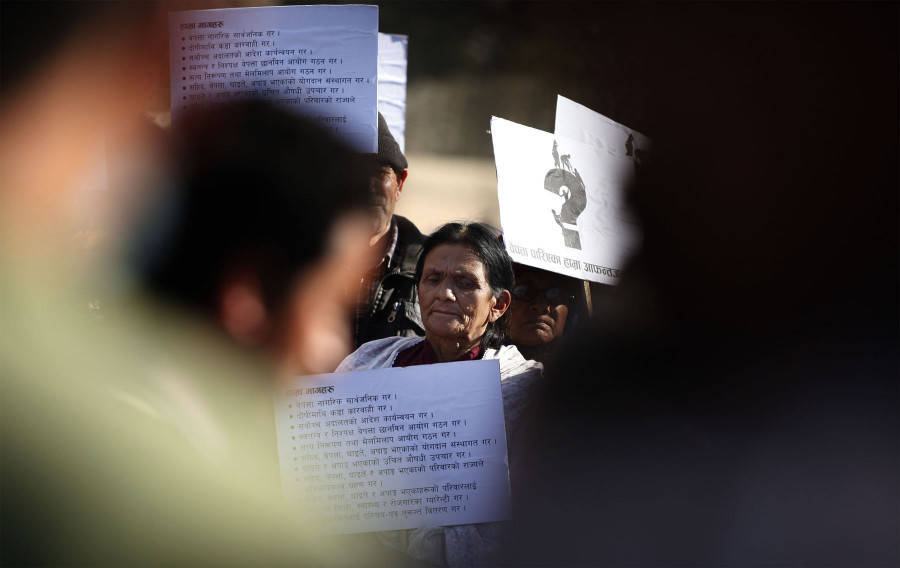National
Disappearance commission starts issuing ID cards
Kin of victims say cards not associated with any facility from the state are of no use when officials are reluctant to address their concerns.
Binod Ghimire
With just two weeks left in its tenure, the Commission of Investigation on Enforced Disappeared Persons on Thursday started distributing identity cards to the kin of people who disappeared during the Maoist insurgency.
Representatives of the victims, however, aren’t happy with the identity cards as they are not associated with any government facility or concession. They allege that the commission is distributing cards just to show the government that they have been working hard.
“What is the meaning of holding the cards when it is of no use to the victims? This is nothing but a sham to show that the commission is working hard,” Suman Adhikari, founding chairperson of Conflict Victims’ Common Platform, told the Post. “The government should announce some facilities for cardholders.”
Families of 21 people who disappeared during the Maoist insurgency, received their identity cards in the presence of Minister for Foreign Affairs Pradeep Gyawali in Bardiya on Thursday.
Though the parties—then-government and the CPN Maoist— to the Comprehensive Peace Accords signed in 2006, agreed to make public the whereabouts of the disappeared within 60 days, it took the commission over 14 years just to start issuing identity cards to the kin of the victims.
Ganga Dhar Adhikari, spokesperson for the commission on enforced disappearance, said it is up to the government to provide facilities and concessions to cardholders, and the commission can only make recommendations.
He said the commission has recommended the government to provide subsidies in health, transportation, and education to cardholders. Officials from the three tiers of government can provide subsidies and relief to the victims, he added.
“We will press local, provincial, and federal governments to announce packages for the victims if our term is extended,” he said.
The distribution of identity cards was also one of the tasks assigned to the two transitional justice bodies—enforced disappearance and the truth commissions—formed in February 2015. “This is a step towards recognising the victims,” Ganga Dhar Adhikari, spokesperson for the commission, told the Post. “This will now open doors for reparations.”
The commission aims to complete the distribution of identity cards within three months if its tenure is extended. Its present tenure is set to expire in February.
Meanwhile, Suman Adhikari from the Conflict Victims’ Common Platform told the Post that the transitional justice commissions have completely failed to investigate complaints filed by victims of the decade-long conflict.
The truth commission received 63,718 complaints but has recorded statements of concerned parties only in 3,787 cases. Similarly, 3,223 complaints were filed with the disappearance commission by family members saying their loved ones had disappeared during the decade-long conflict. Of these, the commission is investigating only 2,506 complaints saying that the rest don’t fall under its jurisdiction.
In February 2015, the Supreme Court ordered the government to amend the transitional justice law to make it adhere to international principles of transitional justice. The court held convicts in cases related to rape, extrajudicial killing, enforced disappearance, and torture cannot be granted amnesty. However, successive governments are yet to amend the law as directed by the court.
As the House of Representatives has been dissolved, the government will have to issue an ordinance to revise the law—to both extend the tenure of the commissions and amend the laws governing them as per the directives issued by the Supreme Court in 2015.
The Ministry of Law and Justice says it is consulting leaders from the Nepali Congress and the Pushpa Kamal Dahal and Madhav Kumar Nepal-led Nepal Communist Party to decide the fate of the commissions and the transitional justice law.
“We have held discussions with the Nepali Congress leaders,” Minister for Law and Justice Lila Nath Shrestha told the Post. “We will make a decision on the tenure of the commissions and the amendment of the transitional justice law after conducting proper discussions,” he added. He said the government will take the necessary decisions by Thursday.
Conflict victims, however, aren’t optimistic that the government will take steps towards amending the law to do away with the controversial amnesty provision.
Maina Karki, chairperson of the platform, said they have been requesting an appointment with Prime Minister KP Sharma Oli. However, he hasn’t given them time. “Though the prime minister is meeting former Maoist combatants, he is reluctant to meet the victims’ representatives. It is clear that the government isn’t serious about our concerns,” she said.




 8.79°C Kathmandu
8.79°C Kathmandu















